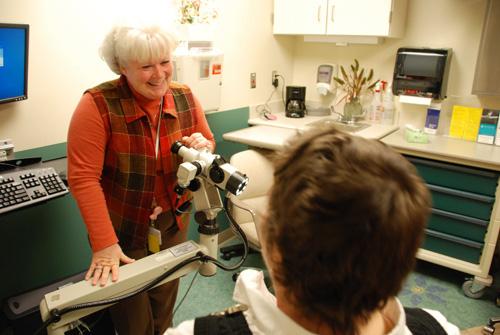Specially trained nurses at Carle help examine sexually assaulted patients

Erica Magda
Jan 23, 2008
Last updated on May 12, 2016 at 08:20 p.m.
Four similar incidents of attempted sexual assault have occurred on campus and in the surrounding area within the last three months.
Two occurred Nov. 1, 2007, one on Dec. 14, 2007, and one Jan. 7.
All female victims escaped with minor injuries.
Anyone who has encountered a sexual assault attempt can seek medical help from a group of seven women at Carle Foundation Hospital called SANEs – Sexual Assault Nurse Examiners – who are specially trained to provide treatment for sexual assault victims.
Get The Daily Illini in your inbox!
This team of registered nurses who work in the emergency department, have had extensive training with sexual assault, including at least 40 hours of classes and 60 hours of clinical experience. Five SANEs have international certification and four are qualified to treat pediatrics.
“Sexual assault is an awful thing,” said Patty Metzler, who began the SANE program in 1999. “But there is help out there.”
When someone has been sexually assaulted and seeks help from the SANEs, the nurses are mandated to notify police, but the patient is not required to speak with the police. The SANE, police, rape crisis and social services work together as a team to help all who need it.
If a SANE is not present when a patient seeks help, they are given 40 minutes to get to the hospital while the patient waits in a private waiting room.
“We allow them as much privacy as possible because it is difficult to sit around other strangers in an emotional state,” Metzler said. “They are traumatized.”
First, the patient is asked about their history; often this is done with the police who are seeking the same information for different reasons, Metzler said. Then they are offered a physical and forensic exam.
“Everything is (the patient’s) choice,” Metzler said. “We put control back into their hands the minute they walk into our facility. We believe that’s important.”
Approximately 48 percent of all sexual assaults who seek help through the SANE program are pediatrics, Metzler said. The other 52 percent is made up of mostly women, but men occasionally seek treatment as well.
“It seems that boys have a different perception of sexual assault than girls,” she said.
As much compassion and privacy as possible is ensured; the consent form is read aloud to the patient and while he or she is asked to remove his or her clothing for further investigation, a gown is held in front of the patient’s body.
The nurse collects swabs from inside the mouth, fingernail scrapings, blood, and pubic combings for the kit. Should there be prosecution later and a need for photographic evidence, an instrument called a colposcope is used to magnify bodily images up to 25 times, which can be videotaped, allowing for still image prints.
The SANE offers tests for sexually transmitted diseases, pregnancy and HIV, but Metzler said the chance of contracting HIV from a one time sexual encounter is less than 1 percent.
Although McKinley does not do any evidence collection for sexual assaults, they do provide post-emergency medical and psychological care, said Dr. David Lawrance, medical director at McKinley.
Lawrance said McKinley encourages anyone who has been assaulted to receive emergency services at either Carle or Provena’s emergency departments as promptly as possible.
“For patients who think they have been drugged, the sooner you come in, the better,” Metzler said. “But the biggest date rape drug is, in fact, alcohol.”
However, not all hospitals in the Champaign-Urbana area have a SANE program. Instead, they offer similar services.
Kimberly Garrison, marketing and public relations manager at Provena Covenant Hospital said that Provena received a joint grant with Carle Foundation Hospital in 1999 to found the SANE program, but due to financial reasons, the program ended in 2004.
“For anyone who needs a sexual assault examination, our exams are always done by a physician and a nurse,” Garrison said. “They just might not have gone through SANE training,”
During the time of the examination, patients who have insurance need to present it at the time of treatment. Otherwise it is considered fraud.
Some college students worry that their parents will find out about treatment of an attempted sexual assault because they are covered under the same insurance, Metzler said. However, insurance companies will not provide a description of the visit.
“This is a vicious crime,” Lawrance said. “The University works closely with the hospitals and with Rape Counseling Services to make sure that all the right things do happen.”





